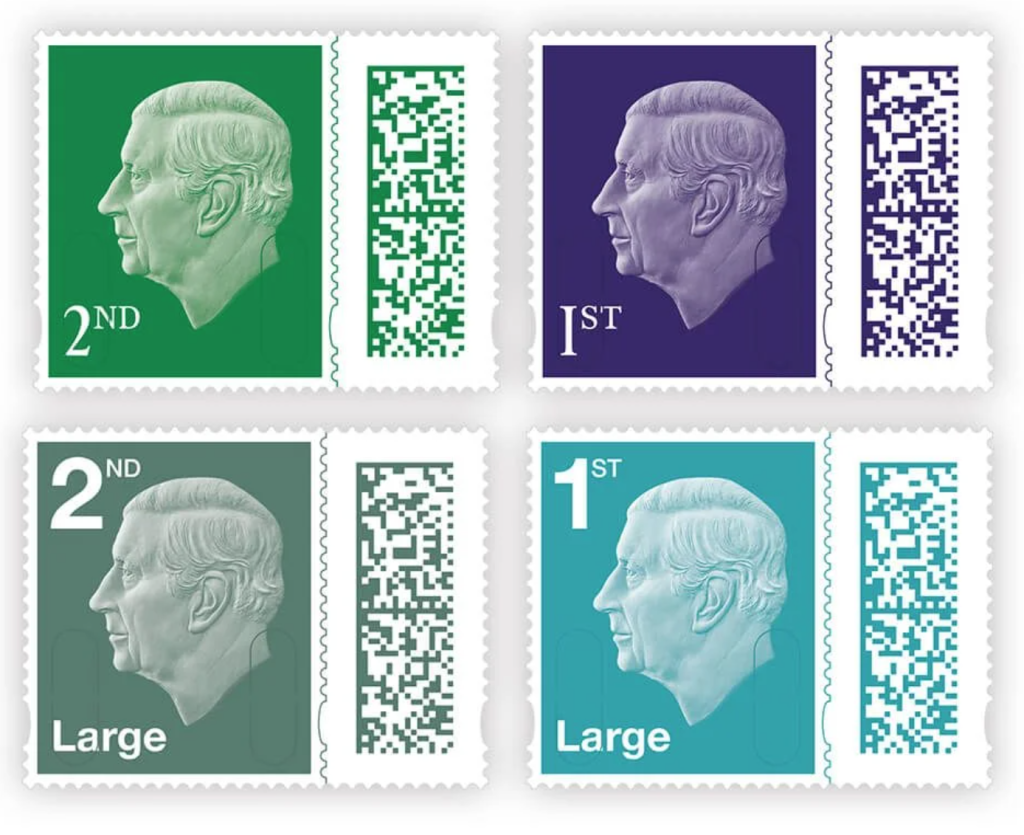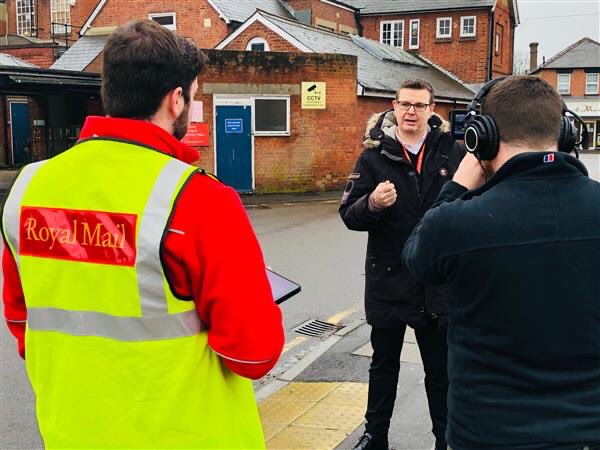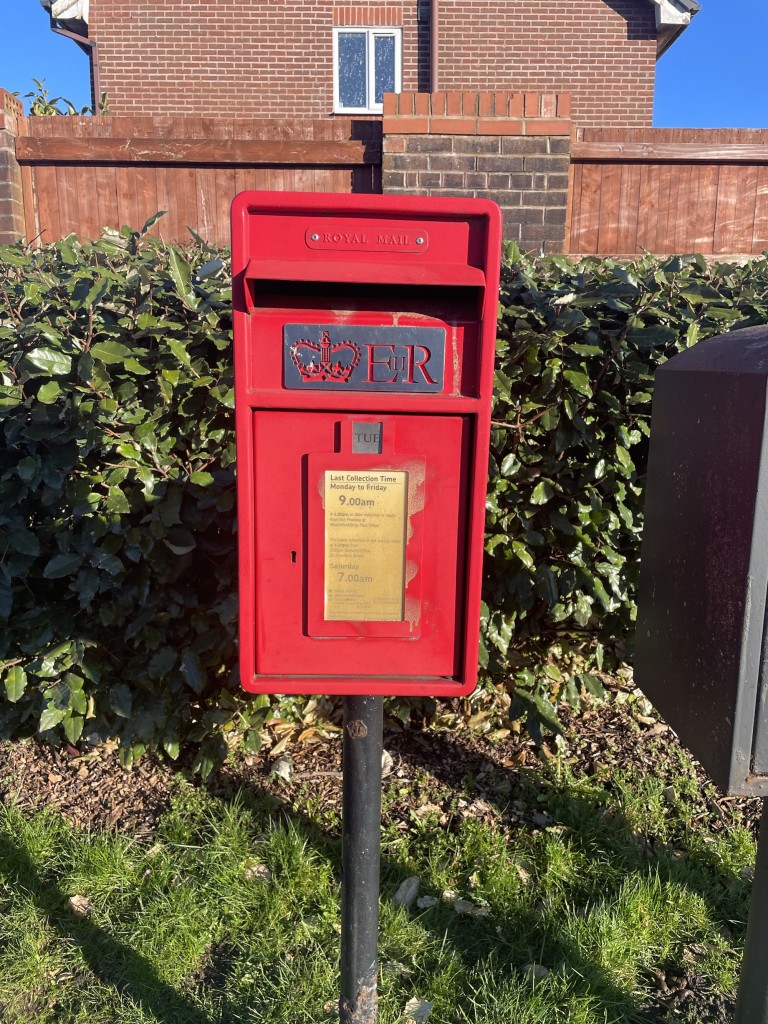Greetings industry condemns Royal Mail’s inflation-busting move as GCA raises issue with government
Universal condemnation has greeted Royal Mail’s announcement of an inflation-busting 16% increase in the price of a first-class stamp, smashing through the £1 barrier with a 15p rise to £1.10 from 3 April.
Even the second-class price, capped by regulator Ofcom “to make sure an affordable option is always available”, is rising by over 10% from 68p to 75p – and the timing means the increase comes into force the day before the first King Charles III stamps will be released.

Publishers and greetings retailers are united in their disgust at the move by Royal Mail, particularly as first-class post no longer guarantees next-day delivery, and it is still angling to cut its Universal Service letter-delivery obligation from six days a week to just Monday to Friday so no cards would arrive for weekend celebrations.
The price rise was the first point GCA ceo Amanda Fergusson raised at an Independent Retailers’ Confederation (IRC) meeting this morning, 7 March, with Kevin Hollinrake, mp and parliamentary under-secretary of state for enterprise, markets and small business – who has now committed to quarterly meetings with the organisation.
Having outlined the greetings industry’s concerns over the ongoing postal strikes that caused havoc during the peak November-December 2022 sending period, Amanda told the mp that “many of our members are suggesting it could be construed that Royal Mail are raising prices to put off consumers sending mail”, and finished with a plea: “It is against this context that many of our members are wondering if, perhaps, the regulator could have done more to safeguard the postal service and avoid this situation. We ask government to consider the benefits to the country of a more robust stance in relation to these price rises.”
Amanda explained that the minister then stated that the “USO is not negotiable”, and said Royal Mail has not made the case that the current model is unsustainable. He also talked about regulation around second-class stamps which limits Royal Mail’s ability to increase the price, and finished by saying that he “understands the greeting card industry’s concern and the points made”, and he’s “going to take it away”.

GCA president and publisher Second Nature’s general manager Chris Bryan commented: “With the economy such as it is and after all of the issues at Christmas, in no small part down to Royal Mail, the timing of this announcement is truly shocking. The public and small businesses should be entitled to rely on as an essential, accessible and affordable postal service but Royal Mail seems hell bent on pricing itself out of the market – we need the government to step in.”
GCA council member David Byk, ceo of Swan Mill Group which owns Ling Design, Penny Kennedy and GBCC, also wants the government to get involved to stop Royal Mail’s “monopolistic arrogance”, saying: “Royal Mail is forcing its inflation-beating agenda on a public that’s suffering with a cost-of-living crisis and an industry which had its Christmas market disrupted by the strikes in 2022.
“Having not been allowed to stop the Saturday letter service without a surcharge they appear to have pushed this increase through to the whole week in order to price out cards and correspondence and make themselves a parcel business by stealth.
“They’re doing this while at the same time issuing a stamp to celebrate our new King – there is nothing royal about this behaviour!”
Fellow GCA council member and Danilo md Daniel Prince said: “It’s beyond disgraceful how much the cost of stamps has increased in last four years, going from 67p in December 2018 to £1.10 and massively outperforming inflation (RPI).
“The biggest problem is the service in the last six months has been atrocious. First class letters often don’t arrive within the stated timeframe, and consumers have lost confidence in the postal service.
These rises will harm it further and, long-term, it’s not good for consumers. Surely the government has to intervene or where does it end!”

Adding her wrath Hazel Walker, senior buyer for cards, gift wrap and stationery for Waterstones, Hatchards, Foyles and Blackwell’s, told PG Buzz: “It’s so disappointing to see stamp prices soar yet again. Royal Mail’s argument is that letter sending is down but increased stamp prices are only going to further this. After the strikes impacting Christmas card sending, this latest increase is certain to have an impact on everyday sales too.”
Jo Wilson, founder at Dandelion Stationery, called the rise “extortionate”, fearing it will make the difference on whether people struggling with the cost of living choose to send a card.
She added: “I’m absolutely gutted to hear the news of the price increases – as a seller on Etsy, for the past few months we’ve been plagued by customers whose parcels have been lost/delayed by Royal Mail. The service they have delivered over the past few months has been poor, so to see such a price increase is like a kick in the teeth.
“If customers bought a first-class stamp, and knew their letter would be delivered the following day, then £1.10 possibly could be palatable – just – but the reality is that people no longer have confidence that post will arrive on time. We’re finding it’s not uncommon for first class mail to take four to five days to arrive.”
Publisher Emma Ball, owner of Emma Ball Ltd, raised the issue of Royal Mail’s privatisation, saying: “it deserves so much more than just feeding shareholders. It’s a little part of what did make this country what it was – caring. Posties care about their jobs and their customers (the general public) but, recently, their bosses seem to think less of us all, what with strikes and, most recently, the hacking debacle – which still isn’t sorted, parcels are still missing!
“Royal Mail would be best placed to oust ceo Simon Thompson and actually get someone in charge that understands what it’s about and get it back on track to the company it could be!
“I do still believe that even for £1.15 you’re making someone’s day when sending a card, however, with the average card price being around £2.75, this could be the nail in the coffin lid for many senders – maybe this is just what the heads at Royal Mail want, the death of the letter, so they can concentrate on more lucrative parcels.”
For sales agent Neil Greenwood, of Reil Agencies, the worry is that it will be another reason for people not to send cards anymore, especially at Christmas with the trend towards making a charitable donation instead.
“I fear this will be yet another nail in the greeting card coffin,” Neil told PG Buzz. “We’re already faced with the problem that younger generations don’t even send cards and instead rely on text messages or posts on social media.
“The positive effect that receiving a physical card in the post has on someone’s mental health cannot be emphasised enough. However, it seems Royal Mail is trying to focus more on its parcel service, and letters are now nothing more than an inconvenience.”

No 14 Ampthill retailer Jo Barber thinks the timing is clever: “Customers will be looking for the new King Charles III stamps, which means we probably won’t stock up on the current stamps to sell in the shop.”
With Christmas the biggest concern for Mark Janson-Smith, co-owner of the Postmark retail group in South London, he has an idea for a special festive rate to encourage early sending at a reduced stamp price, the delivery would take longer but be much cheaper for the consumer.
He said: “We appreciate that costs are increasing everywhere at the moment but yet another huge increase from Royal Mail is concerning and is potentially damaging for the industry.
“With the cost of stamps now higher than your average Christmas card when bought in a pack, we feel consumers will cut back on how many they send. Our personal view is Royal Mail should be encouraging increasing the volume of letter sending rather than increasing prices and where better to do that than the card industry!”
Another idea came from In Heaven at Home indie retailer Anne Barber in Market Harborough, who suggests a special 75p rate for greeting cards, with the price increase limited to letters and business post: “For some older people particularly cards are an important contact with friends and family and it has now become very expensive, almost prohibitively so. Card shops could sell the special stamps.
“I’m concerned this will make people think twice about buying and sending cards and may cut back. Cards are our biggest volume-selling range and bring people in to the shop, and anything which harms this will not be good news. I’ll look at improving our multi-buy offer to give customers a free card at a lower level to help offset the cost of the stamp price increase.”
In East Molesey, The Card Collection indie co-owner Roy Beswick was more accepting: “While any price increase is unwelcome and unhelpful to the greeting card industry, I feel the overall effect will be minimal. Customers do moan about the price of stamps, particularly when bulk sending for the Christmas period, but they still appreciate the value for money the joy of receiving cards through the post brings.
“Everything is going up in cost and Royal Mail is no different to any other business so price increases are inevitable. Having said that, I really hope they continue with Saturday deliveries because I think that would annoy and frustrate a lot of customers more than the price increase.”

But a “horrified” Caroline Ranwell, owner of Hugs & Kisses in Tettenhall, thinks Royal Mail should be reducing stamp prices to encourage more people to use the service and reverse the decline in sending letters and cards.
“This is really bad news for the card industry,” Caroline added, “as it will mean more people will either stop posting cards or at least reduce the amount they send, this is really worrying! By increasing the price the day before King Charles III stamps are released is obviously because they’re well aware a lot of people will want to buy the new stamps.”
In its statement on the price rise, Royal Mail said it was subject to “careful consideration in light of the 25% drop in letter volumes since the pandemic, increasing costs and the highest inflation rates for a generation” and claimed prices “remain competitive” compared to other major European operators, calculating the median stamp price across 29 countries at £1.25.
The company did state it “remains committed to the Universal Service”, but said the costs of delivering this are increasing as letter volumes have decreased from over 20billion letters annually in 2004/5 to eight billion while the number of addresses served by the USO has risen by four million.
On the requirement for a six-day-a-week USO Royal Mail said it expects to report an adjusted operating loss of £350-£450miilion for the full year, leading to last year’s request to cut back to only Monday-Friday letter deliveries – despite previous assurances to the GCA that this was not a consideration – which the government refused.
However, Royal Mail’s claim that “Ofcom’s research shows that a five-day letter service (Monday to Friday) would meet the needs of 97% of consumers and SMEs” is questionable given the same 2020 data also states a significant majority (61%) of residential customers still say they value mail delivery six days a week, and there are numerous caveats including differences consumers attach to the importance of timeliness when sending a greetings card, as opposed to other letters they may send.
























